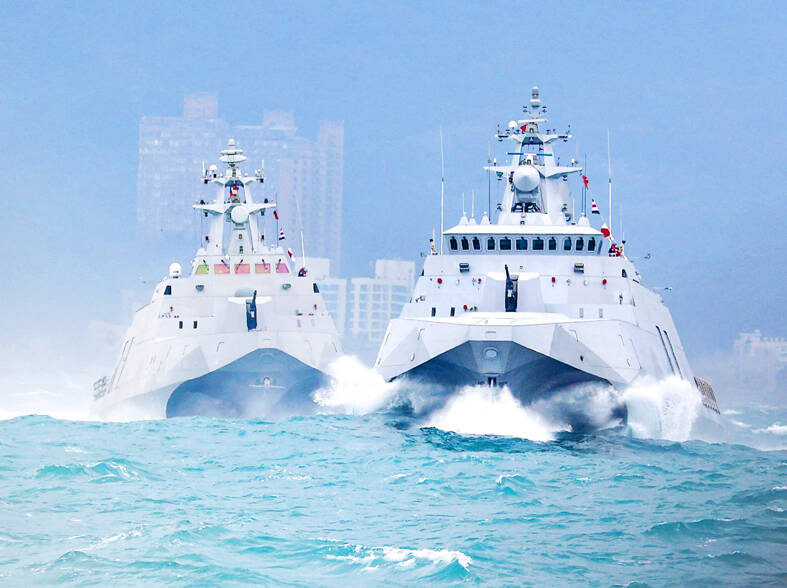The navy next month is expected to commission into service two more domestically built Tuo Chiang-class stealth missile corvettes, a source said yesterday.
The Hsu Chiang (旭江, PGG-621) and the Wu Chiang (武江, PGG-623) would be officially commissioned in a ceremony early next month, the source said, speaking on condition of anonymity.
The corvettes, launched in February and June last year respectively, were delivered to the navy in February. They are the third and fourth Tuo Chiang-class stealth missile corvettes to be produced.

Photo: CNA
The Tuo Chiang-class corvette is a domestically designed and manufactured class of fast and stealthy multipurpose corvette built for the navy.
In addition to the prototype — the Tuo Chiang (沱江, PGG-618), which was commissioned in 2015 — the first batch consists of six corvettes, with the fifth and sixth, the An Chiang (安江, PGG-625) and Wan Chiang (萬江, PGG-626), set to be delivered to the navy soon, the source said.
The navy is to receive 11 Tuo Chiang-class corvettes by the end of 2026.
The Tuo Chiang-class corvette, which has a wave-piercing catamaran design and is 60.4m long and 14m wide, has a top speed of 30 knots (55.6kph) and a range of 1,800 nautical miles (3,334km), the navy says.
The corvette is fitted with subsonic Hsiung Feng II (雄風二, “Brave Wind II”) missiles, supersonic Hsiung Feng III (雄風三, “Brave Wind III”) anti-ship missiles, a 76mm cannon and Hai Chien II (海劍二, “Sea Sword II”) carrier-based medium-range air defense missiles, enabling it to hit air and sea targets simultaneously, the navy says.

DEMOGRAPHICS: Robotics is the most promising answer to looming labor woes, the long-term care system and national contingency response, an official said Taiwan is to launch a five-year plan to boost the robotics industry in a bid to address labor shortages stemming from a declining and aging population, the Executive Yuan said yesterday. The government approved the initiative, dubbed the Smart Robotics Industry Promotion Plan, via executive order, senior officials told a post-Cabinet meeting news conference in Taipei. Taiwan’s population decline would strain the economy and the nation’s ability to care for vulnerable and elderly people, said Peter Hong (洪樂文), who heads the National Science and Technology Council’s (NSTC) Department of Engineering and Technologies. Projections show that the proportion of Taiwanese 65 or older would

Nvidia Corp yesterday unveiled its new high-speed interconnect technology, NVLink Fusion, with Taiwanese application-specific IC (ASIC) designers Alchip Technologies Ltd (世芯) and MediaTek Inc (聯發科) among the first to adopt the technology to help build semi-custom artificial intelligence (AI) infrastructure for hyperscalers. Nvidia has opened its technology to outside users, as hyperscalers and cloud service providers are building their own cost-effective AI chips, or accelerators, used in AI servers by leveraging ASIC firms’ designing capabilities to reduce their dependence on Nvidia. Previously, NVLink technology was only available for Nvidia’s own AI platform. “NVLink Fusion opens Nvidia’s AI platform and rich ecosystem for

Taiwan Semiconductor Manufacturing Co (TSMC, 台積電) yesterday said it is building nine new advanced wafer manufacturing and packaging factories this year, accelerating its expansion amid strong demand for high-performance computing (HPC) and artificial intelligence (AI) applications. The chipmaker built on average five factories per year from 2021 to last year and three from 2017 to 2020, TSMC vice president of advanced technology and mask engineering T.S. Chang (張宗生) said at the company’s annual technology symposium in Hsinchu City. “We are quickening our pace even faster in 2025. We plan to build nine new factories, including eight wafer fabrication plants and one advanced

‘WORLD’S LOSS’: Taiwan’s exclusion robs the world of the benefits it could get from one of the foremost practitioners of disease prevention and public health, Minister Chiu said Taiwan should be allowed to join the World Health Assembly (WHA) as an irreplaceable contributor to global health and disease prevention efforts, Minister of Foreign Affairs Lin Chia-lung (林佳龍) said yesterday. He made the comment at a news conference in Taipei, hours before a Taiwanese delegation was to depart for Geneva, Switzerland, seeking to meet with foreign representatives for a bilateral meeting on the sidelines of the WHA, the WHO’s annual decisionmaking meeting, which would be held from Monday next week to May 27. As of yesterday, Taiwan had yet to receive an invitation. Taiwan has much to offer to the international community’s